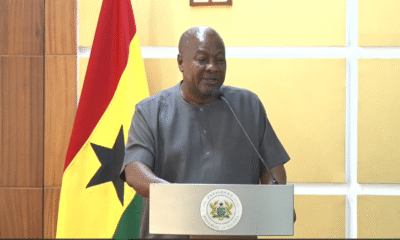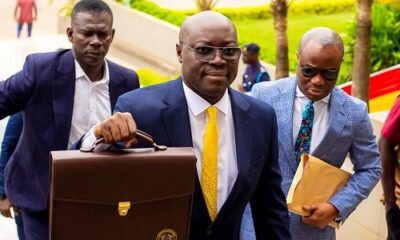News
Gov’t Treatment of Zoomlion Threatens Investor Confidence – UPSA Lecturer Warns

The recent decision by government to review or decentralize sanitation contracts with Zoomlion Ghana Limited could send the wrong signals to investors and disrupt the gains made in the country’s waste management sector, a senior academic has warned.
Dr. Eric Boachie Yiadom, a Senior Lecturer and Climate Finance and Sustainability Expert at the University of Professional Studies, Accra (UPSA), has expressed concern over what he describes as unfair treatment of Zoomlion, a subsidiary of the Jospong Group of Companies, by state authorities.
According to him, the approach could discourage future investments in the sector.
“We need to understand the cycle of industry. An industry has been built up to a certain standard and all that we need to do is to regulate and reduce any monopoly if there is one,” Dr. Boachie Yiadom said.
According to him, “But to say that you are going to decentralize and allow those without capacity to come in, when a lot of investment has already been made is simply not fair.”
He said when Zoomlion started their operations, Ghanaians gave them the name Borla so Gyata, literally meaning lion of waste dump. “Over the years, they have built a multimillion dollar business with massive investments and if you take away the job, what are they supposed to do with the equipment and the people they have hired and trained over the years?” he quizzed?
Dr. Boachie Yiadom made these remarks during a Panel discussion at the 2025 Environmental and Sustainability Summit held at the Alisa Hotel in Accra on Tuesday, June 24, 2025.
The event, organized by the Business and Financial Times (B&FT), had the theme “Ending Plastic Waste in Ghana: A Sustainable Future for All.”
The UPSA lecturer questioned the logic of weakening an industry that has taken years to develop.
He said, “You cannot just go into the waste sector without the infrastructure, the expertise, or the systems. This industry has grown beyond where it used to be. If anything, government should support and help modernize the operations of players like Zoomlion, not weaken them.”
He said just as the oil industry cannot be decentralise for all to partake, so is the waste management industry which has been developed by the Jospong Group.
He called for more coherent national strategies that support long-term sustainability plans, especially for private sector players that have shown commitment to environmental goals.
According to him, “We talk about sustainability, but are we prepared to support sustainable business models and back them with fiscal incentives? One major thing missing in the conversation is the fiscal aspect that gives tax incentives to those who promote reuse and bring in recyclable materials.”
Dr. Boachie -Yiadom concluded with a call to action: “We should be serious about the things we talk about. It’s not enough to dump the problem somewhere. We must coordinate recycling efforts and support the institutions that have gathered the expertise and built the infrastructure.
” That’s how we’ll attract more investment—not by dismantling what’s already working,” he said.
Ing. Dr. Glenn Gyimah, General Manager of the Green Transitions Office at Jospong Group, revealed that the company is currently implementing a pilot project on single-use plastics in collaboration with the Global Environment Facility (GEF) and the United Nations Industrial Development Organization (UNIDO).
“In partnership with IRECOP and our Accra plant, we are demonstrating how single-use plastics like PET bottles can be shredded, processed into yarn, and recycled into fibers with high market value,” Dr. Gyimah said. “We’ve proven that our systems work. What we need now is commitment from government and assurance of environmental integrity,” he added.
He noted that the Jospong Group has created a multimillion-dollar enterprise with proven models that require long-term protection and strategic partnerships.
“In other countries, the private sector receives massive support from government, including funding and regulatory protection. That’s what we need here too,” he said.
Dr. Gyimah added that conversations are ongoing with both local and international off-takers to strengthen Ghana’s recycling value chain and turn waste into economic assets. “We are not just managing waste; we are creating value. And this is a capital-intensive industry that needs backing, not disruption.”
Opening the summit, Minister for Environment, Science, and Technology, Murtala Mohammed, acknowledged the urgent need to reduce plastic waste through low-impact urban practices.
He emphasized the role of circular economy models, calling for a national forum to unite polluters, producers, and policymakers to tackle the plastic menace.
According to the World Bank, Ghana generates approximately 1.1 million tonnes of plastic waste annually, but recycles only five percent of it.
The Council for Scientific and Industrial Research (CSIR) further estimates that over 250,000 tonnes of plastic waste leak into the environment each year clogging drains, polluting freshwater bodies, and contributing to severe flooding in urban centres.
News
President Mahama swears in last batch of deputy ministers of state at the presidency

The President of the Republic of Ghana, His Excellency John Dramani Mahama, has sworn in four deputy minister designates at the presidency.
The deputy ministers are Dorcas Affo Toffey for Transport; James Gyakye Quayson for Foreign Affairs; Mohammed A. Sukparu for Communication, Digital Technology and Innovations; and Prof. Dr. Grace Ayensu Danquah for Health.
President Mahama administered the Oaths of Allegiance, Office and Secrecy, and presented each appointee with an instrument of office in the national colours, red, gold and green.
He noted that this final swearing-in completes the formation of his government’s ministerial team, totaling 60 appointees.
He described this as a clear sign of his commitment to a purposeful and efficient administration.
According to the President, only ministries with heavier workloads and broader responsibilities are assigned deputy ministers.
He stated that his administration is focused on achieving real results and not merely filling positions.
He urged the new deputies to work closely with their sector ministers, remain humble and serve with integrity and accountability.
President Mahama highlighted that the size of government had been reduced, and cost-saving measures such as cuts in fuel allocations and travel budgets were freeing up funds for key sectors like health, education, infrastructure and energy.
He shared encouraging signs of economic recovery, including a drop in inflation, a stronger cedi, improved GDP growth and successful payments to bondholders, students and public schools all without a supplementary budget.
The President condemned a recent incident involving the manhandling of a joy news journalist by military personnel.
He described the act as unacceptable and assured that investigations and sanctions would follow.
Speaking on behalf of the new deputy ministers, Mohammed A. Sukparu thanked the President for the opportunity to serve.
He pledged their full commitment to the President’s vision and promised they would not disappoint the Ghanaian people.
By: Jacob Aggrey
News
Government to train chiefs in Volta Region to resolve disputes and improve local governance – President Mahama

President John Dramani Mahama has announced that the Ministry of Local Government and Chieftaincy will roll out capacity building workshops to strengthen the leadership of traditional rulers in the Volta Region.
The initiative, he said, is part of a bigger plan to enhance the role of chiefs in governance, conflict resolution, and community development particularly in Volta, where chieftaincy disputes are on the rise.
According to the President, the workshops will equip chiefs and traditional council staff with the skills and knowledge to manage disputes, handle community affairs, and better understand their statutory responsibilities.
He made this known during a high-level engagement with the Volta Region House of Chiefs at the Flagstaff House.
The chiefs had raised concerns about the increasing number of unresolved chieftaincy disputes and the limited capacity of newly inaugurated traditional councils.
President Mahama acknowledged the challenges and said government would provide direct funding to support these workshops and ensure that traditional leaders in the region are empowered to function effectively.
He stressed that strengthening the institution of chieftaincy was critical to maintaining peace and stability at the community level, and would support efforts in decentralization and grassroots development.
The President also expressed hope that the ongoing constitutional review process would capture the views of traditional authorities particularly in enhancing their role in sanitation, civic education, and environmental management.
President of the Volta Region House of Chiefs, Togbe Tepre Hodo IV, welcomed the announcement and said the Volta regional house of chiefs was ready to partner with the government to resolve disputes and promote development at the local level.
By: Jacob Aggrey













